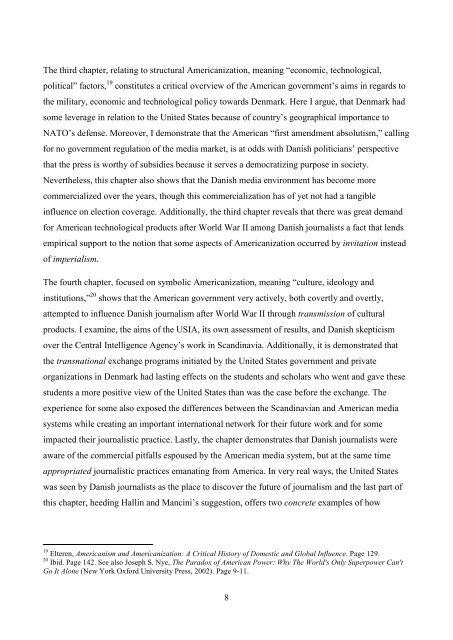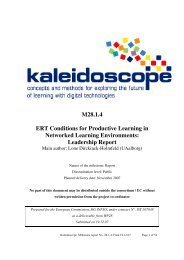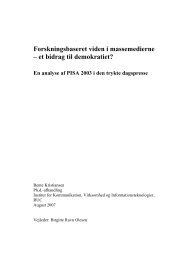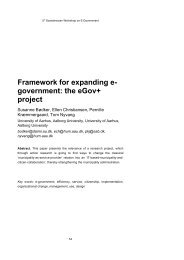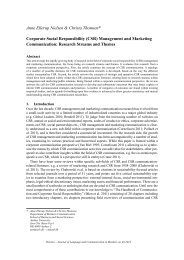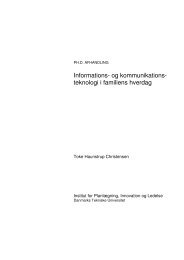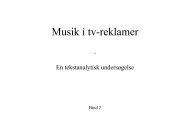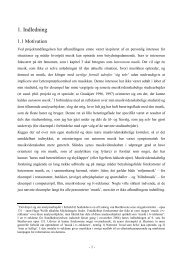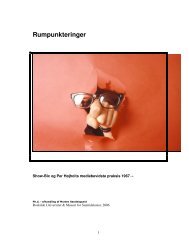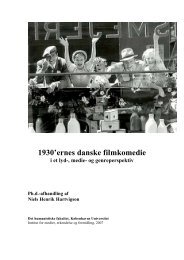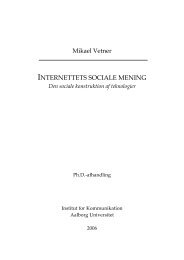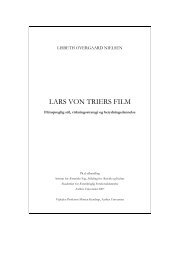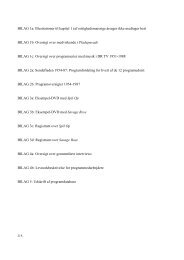The Jeremiad Over Journalism
The Jeremiad Over Journalism
The Jeremiad Over Journalism
Create successful ePaper yourself
Turn your PDF publications into a flip-book with our unique Google optimized e-Paper software.
<strong>The</strong> third chapter, relating to structural Americanization, meaning ―economic, technological,<br />
political‖ factors, 19 constitutes a critical overview of the American government‘s aims in regards to<br />
the military, economic and technological policy towards Denmark. Here I argue, that Denmark had<br />
some leverage in relation to the United States because of country‘s geographical importance to<br />
NATO‘s defense. Moreover, I demonstrate that the American ―first amendment absolutism,‖ calling<br />
for no government regulation of the media market, is at odds with Danish politicians‘ perspective<br />
that the press is worthy of subsidies because it serves a democratizing purpose in society.<br />
Nevertheless, this chapter also shows that the Danish media environment has become more<br />
commercialized over the years, though this commercialization has of yet not had a tangible<br />
influence on election coverage. Additionally, the third chapter reveals that there was great demand<br />
for American technological products after World War II among Danish journalists a fact that lends<br />
empirical support to the notion that some aspects of Americanization occurred by invitation instead<br />
of imperialism.<br />
<strong>The</strong> fourth chapter, focused on symbolic Americanization, meaning ―culture, ideology and<br />
institutions,‖ 20 shows that the American government very actively, both covertly and overtly,<br />
attempted to influence Danish journalism after World War II through transmission of cultural<br />
products. I examine, the aims of the USIA, its own assessment of results, and Danish skepticism<br />
over the Central Intelligence Agency‘s work in Scandinavia. Additionally, it is demonstrated that<br />
the transnational exchange programs initiated by the United States government and private<br />
organizations in Denmark had lasting effects on the students and scholars who went and gave these<br />
students a more positive view of the United States than was the case before the exchange. <strong>The</strong><br />
experience for some also exposed the differences between the Scandinavian and American media<br />
systems while creating an important international network for their future work and for some<br />
impacted their journalistic practice. Lastly, the chapter demonstrates that Danish journalists were<br />
aware of the commercial pitfalls espoused by the American media system, but at the same time<br />
appropriated journalistic practices emanating from America. In very real ways, the United States<br />
was seen by Danish journalists as the place to discover the future of journalism and the last part of<br />
this chapter, heeding Hallin and Mancini‘s suggestion, offers two concrete examples of how<br />
19 Elteren, Americanism and Americanization: A Critical History of Domestic and Global Influence. Page 129.<br />
20 Ibid. Page 142. See also Joseph S. Nye, <strong>The</strong> Paradox of American Power: Why <strong>The</strong> World's Only Superpower Can't<br />
Go It Alone (New York Oxford University Press, 2002). Page 9-11.<br />
8


